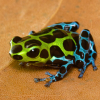To be clear, it is no myth that red filters produce a different effect on ants in comparison to unfiltered, white light. The controversy arises, however, from the semantic distinction of whether red light becomes "invisible" to ants, which devolves to the dubious claim that "ants can not see red light" entirely.
In fact, filtered red light is detectable to both ants and humans, but exists on the very edge of the visible spectrum. Extremely light-sensitive ants such as
Formica sp., for example, will continue to become extremely agitated if a bright red filtered light is shone on their dark nest.
On the opposite end of of this spectrum lie the blues and ultraviolets that make up sunlight, the latter of which ants have evolved to be particularly well attuned. In a world where the ant nest is often completely devoid of sunlight—all while the outside world is bathed in it—it makes perfect sense that ants would exhibit less stress in a nest environment that is kept as dark as possible, and become agitated when this environment is rapidly changed. So why does red filtered light seem to cause less disturbance to the ants, and is it possible to achieve this effect through other means?
To answer these questions, we must first understand that animals process visual stimuli through both chromaticity—what color something is, independent of brightness—and luminance—how bright something is, independent of color or hue. The act of white light passing through a red filter will cause the other wavelengths to be converted into heat energy, only allowing the red colors, and the energy that comes from them, to pass through. So we have not only filtered out every color except red, but also we have greatly reduced the overall energy carried by this visible light. To the ants, this effectively causes a reduction in
luminance or brightness. Any ant colony will naturally gravitate to the darkest spot if unhomed, and so less brightness is almost always associated with a more favorable nest location.
If we were to conduct an experiment, we would find that the overall relative brightness tolerated by ants to distinguish nest from outside world is established shortly after eclosing. This explains why queens and wild-caught colonies are frequently particularly difficult to condition to indoor lighting conditions, whereas workers from colonies raised from a queen under some lighting exhibit far more relaxed preferences.
From these facts, we may extrapolate that any material which substantially reduces the luminance or brightness of a nest, even without eliminating visible light entirely, may be a favorable tool for acclimating ants to natural indoor lighting conditions. This includes, but is not limited to, red light filters.
Edited by drtrmiller, March 19 2017 - 6:37 PM.


















